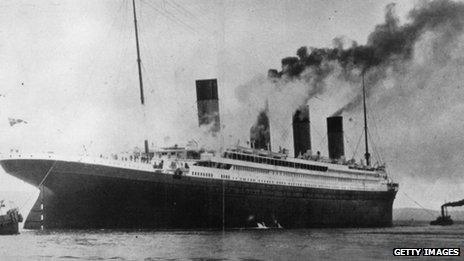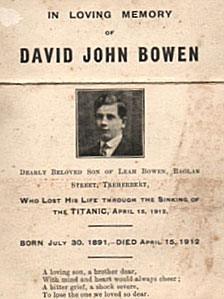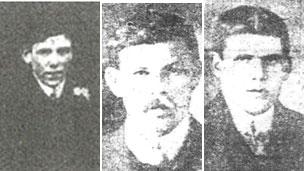Titanic: Victims from Wales of 1912 liner tragedy
- Published

Titanic seemed nearly as big as his home village to Treherbert boxer Dai Bowen
When Titanic sank with the loss of 1,500 lives, Wales was not left untouched by the tragedy. Around a dozen passengers and crew with strong connections to Wales died, but who were they?
Of those paying, some were on their way to start a new life in the United States and Canada, others were on business trips.
For boxers Dai Bowen and Les Williams, from the Rhondda, their business was boxing. The best friends had been given the opportunity of a lifetime to fight in the United States in a series of contests by a Pennsylvania promoter.
The American had taken them on recommendation of Welsh boxing journalist Charlie Barnett after rejecting another valleys fighter Jimmy Wilde as being too small. So Bowen, 26, a Treherbert collier and Williams, 28, a blacksmith from Tonypandy were offered their passage, prize money and expenses.
They had been booked on another liner, Baltic, but apparently switched to Titanic so they could have new suits made. They embarked at Southampton on £8 tickets in third class.

'A bitter grief, a shock severe' reads the memorial
Bowen wrote to his widowed mother on 11 April, while the ship took on board passengers in France: "This is a lovely boat, she is very near so big as Treherbert; she is like a floating palace."
His body was never recovered. The Rhondda Leader described him as a "most popular man, who had made great progress."
The body of lightweight Williams, who weighed 8st 10lbs and was described as a "promising fighter" was recovered, but to add to the grief of family he was buried at sea rather than returned home.
Williams left a widow and young son. A daughter of his widow from a later marriage told BBC Wales in 1999 of the correspondence from Titanic.
"When he was on the Titanic, he sent a postcard from Southampton, another one from Queenstown [Cobh, Ireland] and a very long letter which were the last messages," she said.
"When you read those, you realise what a lovely person he was."
The boxer Wilde, who was by good fortune left at home in Tylorstown four years later won the world flyweight title and became according to boxing writer and historian Gareth Jones the "greatest boxer Britain has ever produced".
Bowen wrote in that last letter of the "plenty of fun on board" and of meeting "two Swansea boys".
They were probably two miners from Pontardawe, who were also among the dead. William Rogers, 29, travelled with his nephew Evan Davies, 22. Rogers, according to newspaper reports, had a local court order made against him for desertion by his wife.
Annie Meek, 31, from Penarth, was the estranged wife of a garage owner, off to make a new life. "She was on her way to a situation as a nurse in New York, she having been parted from her husband, who suddenly left her a few months ago," reported the <italic>Penarth Times</italic>.
Mrs Meek, on the passenger list as a cook, had left two children under six at home with her mother and the <link> <caption>Glamorgan Archives</caption> <url href="http://www.glamarchives.gov.uk/content.asp?nav=3&parent_directory_id=1&id=89" platform="highweb"/> </link> have released documents showing fund-raising on their behalf by the Lord Mayor of Cardiff after her loss.
Another from the same town, Jim Reed, was just 19. Originally from Grangetown in Cardiff, one of six children born to a boilermaker, he was heading for Canada to work as a butcher on a ticket costing £7 5s.
Others arrived on board by a more circuitous route. Eliezer or Leslie Gilinkski, 22, had escaped anti-Semitic prejudice in Lithuania and the prospect of a long period of Russian military conscription to spend his last few months with his shop owner brother David in Abercynon.
"A most amiable man," according to the Aberdare Leader, the locksmith was following other migrants for prospects of a new life in Chicago. Family believed he was among a group of passengers who made it to an ice floe but froze to death. His body was recovered and buried at sea.
Men in second class berths were statistically more likely to die in the disaster than any other group - only 8% survived.
One of the second class victims was Norman Leyson, 25, the son of a Swansea solicitor. The mining engineer was lately working in London but was a member of Sketty cricket club and had recently joined the masons in Neath. His body was recovered - among items was a silver case with the initials RWNL. There is a commemorative plaque in Cadoxton parish church near Neath.
Denzil Jarvis, 47, was born in Caerleon near Newport, but his carpenter father had taken the family to live in the Midlands. Jarvis was the managing partner of an engineering firm, living in some style with his wife and two children in Leicester.

Among the dead were Jim Reed, William Rogers and his nephew Evan Davies
He was taking new equipment for Henry Ford with him on a business trip on a £13 ticket. He reportedly used his engineer's eye to estimate the size of the iceberg after the collision, in a remark to a fellow passenger.
"For some it would have been their first experience of an ocean-going liner but what I found fascinating was how busy the passenger traffic was across the Atlantic from Europe at this time," says historian Richard Davenport-Hines, author of Titanic Lives: Migrants and Millionaires, Conmen and Crew.
"For many they would never have had a proper holiday. The White Star line was not about speed, but quality of accommodation. Even for those in third class, there were three meals a day, clean bed linen, music and dancing, and there would have been a semi-carnival atmosphere for the majority."
That ended suddenly in the early hours of 15 April 1912.
There were also crew on board from Wales who perished - possibly half a dozen, ranging from firemen to stewards - although most were residents of Southampton and some connections are hard to verify.
They included Cardiff-born saloon steward Robert Davies, aged 26, whose body was recovered by the ship Mackay Bennett and he was buried in Nova Scotia. Another from Cardiff was Thomas James, 27, a fireman in the Titanic engine rooms.
Fellow steward Owen Wilmore Samuel, 40, born in Llandeilo, Carmarthenshire, was the son of a doctor and brother of a Swansea auctioneer and estate agent. He had an itinerant career which saw him work as a draper and an accountant in Sheffield and Liverpool, before becoming a ship's steward for health reasons.
Samuel left a widow and young daughter <italic>. </italic>In a twist of fate, his sister-in-law, originally from Fishguard, was married to the chief second class steward John Hardy, who survived.
His body was found in his steward's unform, and his personal effects tell their own poignant story of a life cut short: An engraved knife, scissors, a corkscrew and 1s 8d in his purse.
- Published13 April 2012
- Published12 April 2012
- Published30 March 2012